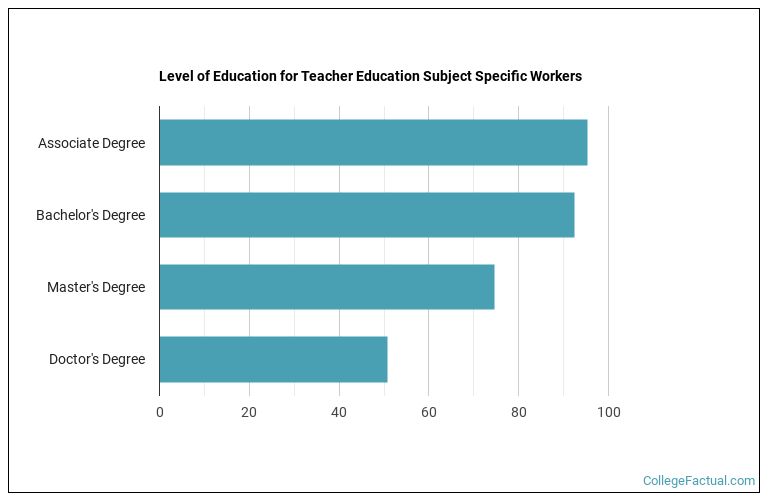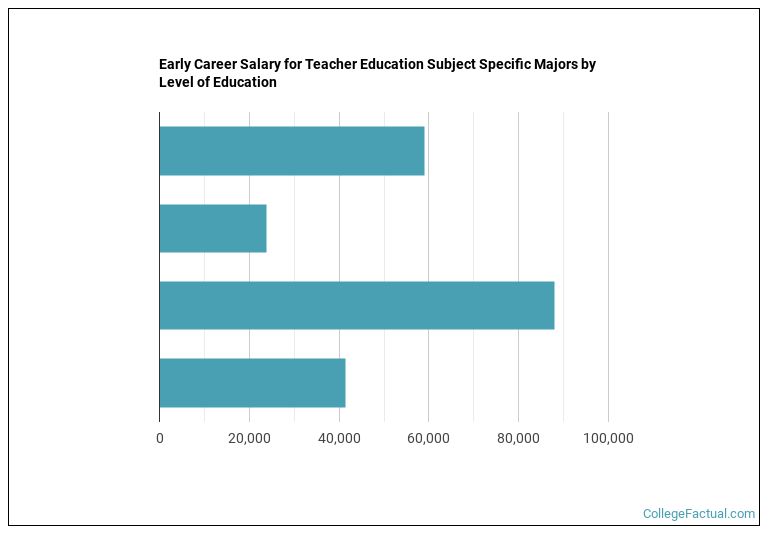 by our College Data Analytics Team
by our College Data Analytics TeamA major in Teacher Education & Development prepares you teach different subjects to students. This means you could teach English, history, chemistry, math, or even art. The subject possibilities are endless, what is important is that you focus your major around what you are interested in and also pursue a teaching certificate. Each teacher education program is different based on what college you attend and your focus. This program will prepare to become a classroom teacher on your specific subject.
Every college will require different courses for your degree. You will be required to take content courses based upon your focus. These courses will vary depending on the path you intend to pursue. Education courses will also be required; for example literacy, educational psychology, and teaching methods. Concentrations in this major include anything from Agricultural and Art, to Driver and Safety Ed, Health, Math, Music, Science, Computers, Technology and much more.
In 2021-2022, teacher education subject specific was the 22nd most popular major nationwide with 42,343 degrees awarded. This year's Best Teacher Education Subject Specific Schools ranking compares 450 of them to identify the best overall programs in the country. Continue reading to check out one of our many unbiased rankings of subject specific ed programs later in this article.
As a teacher, you make the decision about what is being taught in your classroom. You need to have direction and organizational skills in order to make sure what is required by your district is being covered in your classroom. Another skill that is necessary is to be authoritative; it is important to ensure learning will happen in your classroom. You need to be assertive and maintain control while you are teaching your students. However, other important traits of a teacher include patience and creativity. You should also be approachable and kind. Students respect teachers who respect them. Students are also willing to share their problems when teachers show that they are available and they want to help.
Creativity is important in every subject. Students have a short attention span, especially when other students are around to distract them. It is important to use your resources such as technology, other teachers, and items in your community to add to your lessons. An example of this might be teaming up with the science teacher to have a lesson on both the history of mummification and a science lesson on how people were mummified. Then you could all go on a field trip to a museum to view mummies. You cannot be afraid to ask for help or to work with colleagues to make your students learning memorable and exciting.
You should be confident in your subject matter. You should be willing to research to answer difficult questions from your students, while at the same time admitting when you are stumped and get your students on board with figuring out an answer.
In order to become a teacher you must complete a semester of student teaching and become certified in your state. Prior experience working with kids will help you decide if this is the right career for you.
teacher education subject specific degree applicants generally need have finished high school or their GED. Many schools may also have GPA and SAT/ACT score minimums that must be met. Specific subject specific ed careers may require a certain level of degree attainment or additional certifications beyond that.
There are many different subject specific ed degree levels. You can get anything from a in teacher education subject specific to the highest subject specific ed degree, a . The type of subject specific ed degree you choose will determine how long it takes to get your diploma.
| Degree | Credit Requirements | Typical Program Length |
|---|---|---|
| Associate Degree | 60-70 credits | 2 years |
| Bachelor’s Degree | 120 credits | 4 years |
| Master’s Degree | 50-70 credits | 1-3 years |
| Doctorate | Program required coursework including thesis or dissertation | At least 4 years |
A doctor's degree is the most common level of education achieved by those in careers related to subject specific ed, with approximately 43.2% of workers getting one. People currently working in careers related to subject specific ed tend obtained the following education levels.
| Level of Education | Percentage of Workers |
|---|---|
| Doctoral Degree | 41.7% |
| Master’s Degree | 23.4% |
| Bachelor’s Degree | 16.6% |
| Post-Doctoral Training | 7.9% |
| Associate’s Degree (or other 2-year degree) | 2.8% |
About 50.7% of workers in careers related to subject specific ed obtain at least doctor's degrees. See the chart below for the most common degree level workers in teacher education subject specific have received.

The education level required is different depending on the subject specific ed career you are seeking.
With a degree in teaching you can become a classroom teacher for your specific subjects. Most colleges will require you to get a Master's degree in your concentration which will allow you to succeed in any job in relation to your degree.
Want a job when you graduate with your subject specific ed degree? Teacher Education Subject Specific careers are expected to grow 9.4% between 2016 and 2026.
The following options are some of the most in-demand careers related to teacher education subject specific.
| Occupation Name | Projected Jobs | Expected Growth |
|---|---|---|
| Elementary School Teachers | 1,514,900 | 7.4% |
| High School Teachers | 1,095,500 | 7.5% |
| Teachers | 1,091,800 | 9.9% |
| Middle School Teachers | 677,700 | 7.5% |
| Fitness Trainers and Aerobics Instructors | 329,200 | 10.0% |
Recently graduated teacher education subject specific students earned an average of $49,542 in <nil>. Earnings can range from as low as $9,695 to as high as $101,369. As you might expect, salaries for subject specific ed graduates vary depending on the level of education that was acquired.

Salaries for teacher education subject specific graduates can vary widely by the occupation you choose as well. The following table shows the top highest paying careers subject specific ed grads often go into.
| Occupation Name | Median Average Salary |
|---|---|
| Health Specialties Professors | $122,320 |
| Economics Professors | $117,180 |
| Physics Postsecondary Professors | $103,830 |
| Business Professors | $103,330 |
| Atmospheric, Earth, Marine, and Space Sciences Professors | $101,890 |
With over 8,562 different subject specific ed degree programs to choose from, finding the best fit for you can be a challenge. Fortunately you have come to the right place. We have analyzed all of these schools to come up with hundreds of unbiased subject specific ed school rankings to help you with this.
One of 14 majors within the Education area of study, Teacher Education Subject Specific has other similar majors worth exploring.
| Major | Annual Graduates |
|---|---|
| Physical Education Teaching & Coaching | 7,516 |
| Reading Teacher Education | 6,010 |
| Music Education | 4,909 |
| Mathematics Education | 3,269 |
| English & Language Arts Education | 3,161 |
| Related Major | Annual Graduates |
|---|---|
| Teacher Education Grade Specific | 110,770 |
| Educational Administration | 46,975 |
| Special Education | 35,973 |
| General Education | 29,389 |
| Curriculum & Instruction | 19,217 |
Image Credit: By Aparajita Datta under License More about our data sources and methodologies.